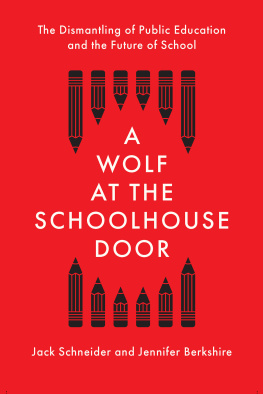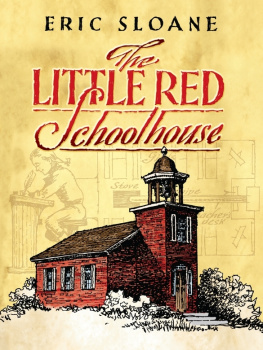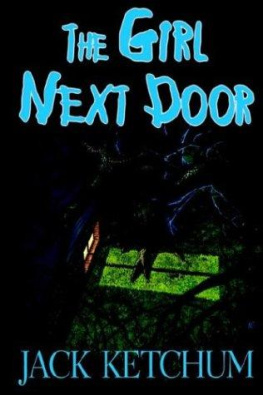Jack Schneider - A Wolf at the Schoolhouse Door
Here you can read online Jack Schneider - A Wolf at the Schoolhouse Door full text of the book (entire story) in english for free. Download pdf and epub, get meaning, cover and reviews about this ebook. year: 2020, publisher: The New Press, genre: Politics. Description of the work, (preface) as well as reviews are available. Best literature library LitArk.com created for fans of good reading and offers a wide selection of genres:
Romance novel
Science fiction
Adventure
Detective
Science
History
Home and family
Prose
Art
Politics
Computer
Non-fiction
Religion
Business
Children
Humor
Choose a favorite category and find really read worthwhile books. Enjoy immersion in the world of imagination, feel the emotions of the characters or learn something new for yourself, make an fascinating discovery.
- Book:A Wolf at the Schoolhouse Door
- Author:
- Publisher:The New Press
- Genre:
- Year:2020
- Rating:4 / 5
- Favourites:Add to favourites
- Your mark:
- 80
- 1
- 2
- 3
- 4
- 5
A Wolf at the Schoolhouse Door: summary, description and annotation
We offer to read an annotation, description, summary or preface (depends on what the author of the book "A Wolf at the Schoolhouse Door" wrote himself). If you haven't found the necessary information about the book — write in the comments, we will try to find it.
A Wolf at the Schoolhouse Door — read online for free the complete book (whole text) full work
Below is the text of the book, divided by pages. System saving the place of the last page read, allows you to conveniently read the book "A Wolf at the Schoolhouse Door" online for free, without having to search again every time where you left off. Put a bookmark, and you can go to the page where you finished reading at any time.
Font size:
Interval:
Bookmark:

Also by Jack Schneider
Beyond Test Scores: A Better Way to Measure School Quality
From the Ivory Tower to the Schoolhouse: How Scholarship Becomes Common Knowledge in Education
Excellence for All: How a New Breed of Reformers Is Transforming Americas Public Schools
Also by Jennifer Berkshire
More Worlds to Negotiate: John Dunlop and the Art of Problem Solving
THE DISMANTLING OF PUBLIC EDUCATION AND THE FUTURE OF SCHOOL
Jack Schneider and Jennifer Berkshire

Education is our only political safety. Outside of this ark all is deluge.
Horace Mann
A WOLF AT THE SCHOOLHOUSE DOOR
W hen Secretary of Education Betsy DeVos was asked in an interview whether she saw the coronavirus pandemic as an opportunity to advance the cause of private school choice, she responded without hesitation. Yes, absolutely.
As schools across the country confronted the crisis and its unprecedented financial consequences, DeVos remained single-mindedly focused on the agenda that made her Donald Trumps most controversial cabinet pick. In the weeks after schools shut down, DeVos encouraged states to use federal funds to help parents pay private school tuition, and demanded that school districts share millions of aid dollars with wealthy private schools.
Initially, DeVos was treated as more of a joke than a threatan impression solidified by a series of clumsy media appearances. Yet DeVos was no political naf. Upon taking office, she immediately made clear her disinterest in the public schoolsthough they are attended by the vast majority of American childrenusing her policy perch to advocate for breaking up what she derisively calls the system.
Close observers have been struck by DeVoss radical agenda. But as we argue in this book, the agenda is not hers alone. While DeVos has been the most prominent public face of the recent push to dismantle public education, she is not its architect. The movement has been steadily gaining power and notching progress for decadesbuilding financial support, erecting a policy infrastructure, and constructing a finely honed public message.
In recent years, bestsellers like Dark Money by journalist Jane Mayer and Democracy in Chains by historian Nancy MacLean have examined efforts by the radical right to fundamentally alter the American political system. Yet these works have largely overlooked public education in their accounts. The billionaires populating the pages of these booksthe Bradleys, the DeVoses, the Kochshave long been fixated upon the nations system of public schools, and have slowly laid the groundwork for its unraveling. Now, in our postCitizens United era, conservative elites are increasingly able to translate their animus against public education into state-level policy.
When the Koch network held its annual retreat in 2018 at a resort outside of Palm Springs, the seven hundred attendeesamong the richest people in Americawere instructed to go all in on efforts to transform the education system. We can change the trajectory of the country, Charles Koch told donors during a cocktail reception. Among the networks priorities: replacing brick-and-mortar schools with a voucher program that would allow parents to purchase education products for their children in an Amazon-like marketplace.
That K-12 education is in the sights of conservative plutocrats shouldnt come as a surprise. Public schools are the biggest ticket item in many state budgets, making them a prime target for antitax crusaders. Then theres the fact that the countrys teaching force, some 3 million strong, remains overwhelmingly unionizedthe single largest body of union members in the country. But there is something more fundamental at stake here beyond just an ideological commitment to small government or a deep-seated loathing of unions. As political economist Gordon Lafer notes, education is the one remaining public good to which most Americans still believe we are entitled to by right of citizenship.
This book began in response to a puzzling question: Why had conservative policy ideas, hatched decades ago and once languishing due to a lack of public and political support, suddenly roared back to life in the last five or so years? Take, for example, the idea of private school vouchers, the ignominious origins of which can be traced to the backlash against court-ordered desegregationwhen state and local governments across the South paid for white citizens to send their children to private schools. With the exception of a brief and ill-fated push by the Reagan administration, vouchers had slowly faded from the conservative policy agenda. So what explained their return as a disruptive innovation?
In the spring of 2019, DeVos unveiled an ambitious new school choice initiative. At the center of the effort was a proposed $5 billion fund, providing individuals and corporate donors with a dollar-for-dollar tax credit for giving to scholarship programs that help families pay for tuition at private schools, homeschooling expenses, and other education services. But while the hashtag #educationfreedom was new, the rest of DeVoss agenda was a ripped-from-the-eighties retread. More than three decades earlier, her predecessor, Ronald Reagans controversial secretary of education William Bennett, also pitched tax-credit scholarships, along with school vouchers for low-income parents. Even education savings accounts, which let parents spend state education dollars on an array of what DeVos terms education options, date back to the Reagan era.
As we began to explore other policies favored by conservative hard-linersmarket-based school choice, for-profit schools, virtual schooling, and the rollback of regulationswe noticed a similar pattern. Schemes that had first emerged as policy pipe dreams had been carefully stripped of their ideological underpinnings. Repackaged as new ideas, and accompanied by high-minded rhetoric, theyve taken on new life. The ideological origins of these proposals have been largely forgotten, as have the battles fought over them. Meanwhile, the true believers have been building donor networks, cultivating political alliances, developing policy infrastructure, and crafting road-ready legislation.
Todays target is the system, a catchall intended to conjure up waste, red tape, and soul-crushing bureaucracy. Yet the aim goes much deeperstriking at the core principles animating taxpayer-supported education. Indeed, the very idea of public education as a common good is depicted as an impingement on the freedom of individual students and their parents. You cant have a one-size-fits-all system for every childs particular needs, said Mary Fallin, the former governor of Oklahoma, in a promotional video for the conservative Heritage Foundation touting education savings accounts.
Lawmakers, state officials, think tanks, and advocacy groups endlessly repeat such claims about the shortcomings of the existing system, hiding their radically conservative vision of schooling beneath banally familiar language. Listen closely, though, and the sharp ideological edge is hard to miss. At a 2017 appearance before the American Legislative Exchange Council, Betsy DeVos gleefully repurposed Margaret Thatchers infamous claim that there is no such thing as society. There is no education system, DeVos told the corporate lobby group. This is about individual parents, students, and families.
Font size:
Interval:
Bookmark:
Similar books «A Wolf at the Schoolhouse Door»
Look at similar books to A Wolf at the Schoolhouse Door. We have selected literature similar in name and meaning in the hope of providing readers with more options to find new, interesting, not yet read works.
Discussion, reviews of the book A Wolf at the Schoolhouse Door and just readers' own opinions. Leave your comments, write what you think about the work, its meaning or the main characters. Specify what exactly you liked and what you didn't like, and why you think so.








